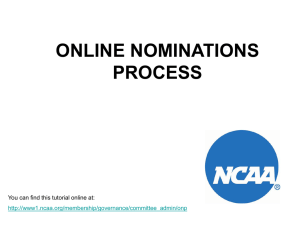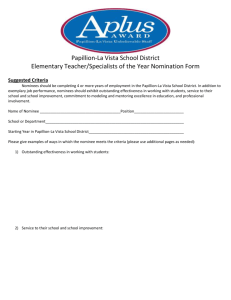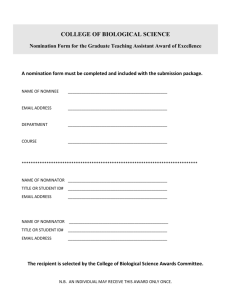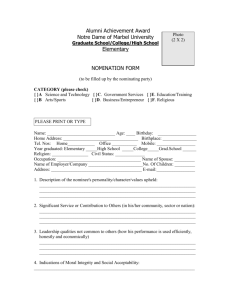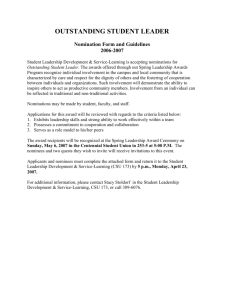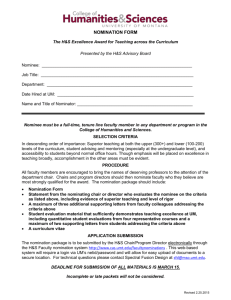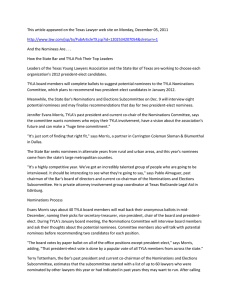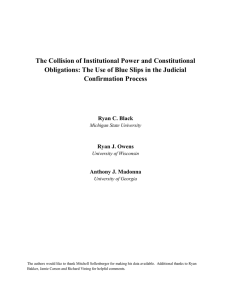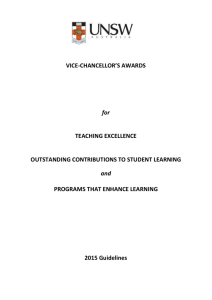The University Of Sheffield Memo template.
advertisement
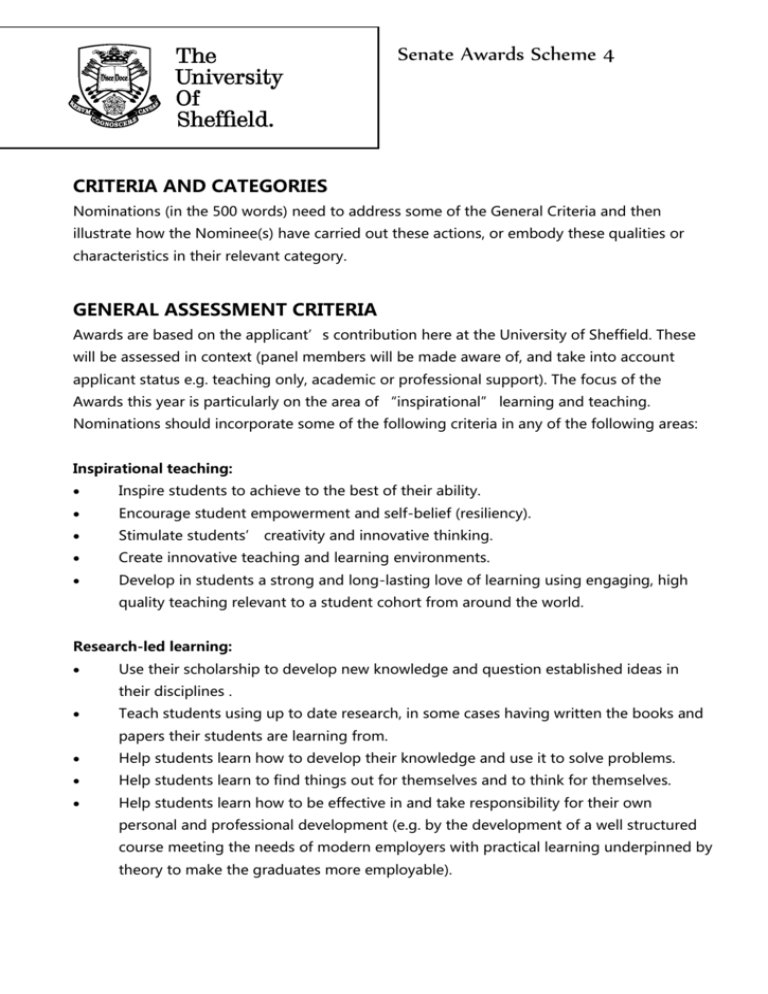
Senate Awards Scheme 4 CRITERIA AND CATEGORIES Nominations (in the 500 words) need to address some of the General Criteria and then illustrate how the Nominee(s) have carried out these actions, or embody these qualities or characteristics in their relevant category. GENERAL ASSESSMENT CRITERIA Awards are based on the applicant’s contribution here at the University of Sheffield. These will be assessed in context (panel members will be made aware of, and take into account applicant status e.g. teaching only, academic or professional support). The focus of the Awards this year is particularly on the area of “inspirational” learning and teaching. Nominations should incorporate some of the following criteria in any of the following areas: Inspirational teaching: Inspire students to achieve to the best of their ability. Encourage student empowerment and self-belief (resiliency). Stimulate students’ creativity and innovative thinking. Create innovative teaching and learning environments. Develop in students a strong and long-lasting love of learning using engaging, high quality teaching relevant to a student cohort from around the world. Research-led learning: Use their scholarship to develop new knowledge and question established ideas in their disciplines . Teach students using up to date research, in some cases having written the books and papers their students are learning from. Help students learn how to develop their knowledge and use it to solve problems. Help students learn to find things out for themselves and to think for themselves. Help students learn how to be effective in and take responsibility for their own personal and professional development (e.g. by the development of a well structured course meeting the needs of modern employers with practical learning underpinned by theory to make the graduates more employable). 2 Contribution to the Sheffield Graduate: Help students learn how to be flexible, adaptable and reflective in their approach, so that they can adapt to the changing demands of their future careers rather than holding on to a fixed body of knowledge. Show students how research makes a difference to our understanding of the world around us and to the solution of its problems: so students learn how to make that difference themselves. Communicate the attributes of the Sheffield Graduate and the distinctiveness of the Sheffield learning experience. Encourage students to take advantage of social and cultural opportunities outside their studies. Enhance the welcome and induction for all students. Working together/Creating the right environment: Have a positive influence on colleagues and community, and foster a sense of community in the student cohort both within and outside the classroom (locally and internationally) Create or develop high-quality strategic partnerships for learning and teaching (or for research and innovation) which may enable students to apply their skills and talents prior to graduation. Ensure that students understand and benefit from the employability focus in their courses. Increase the role of student ambassadors within learning communities. Help students learn in a context where students’ own personal advancement is supplemented by their understanding of the possible impacts of knowledge on other people. Help students experience the wider benefits of an inter-disciplinary and multi-faceted university with an international reach and reputation. Applicants should note that the list of qualities and characteristics above in the Assessment Criteria is not intended as a comprehensive or limiting checklist. Applicants can, as appropriate, cite other characteristics that describe their/the team’s excellence in teaching and/or support of learning and teaching and its wider community. Alternatively, demonstration of these criteria does not guarantee an Award. CATEGORY DEFINITIONS Category One: Sustained Excellence Nominees must have practised and developed their skills over a minimum period of six years. Nominees for this category need to demonstrate both sustained development and innovation 3 across a breadth of activities as well as being a “model” of excellence for others in the area of inspirational learning and teaching. They will also need to show how they have expertise or influenced their field/profession, colleagues or the wider context of education. Category Two: Early Career This category is awarded in recognition of emerging excellence in teaching and/or learner support for a period of less than six years. The nominee must demonstrate a number of the general assessment criteria and show general engagement in the area of inspirational learning and teaching. They should have some impact upon the broader learning community that has impact beyond the purely personal. Category Three: Collaboration To be considered worthy for this category the Nomination should explain the aims or impact of the collaboration, how the collaboration was carried out and why it differs from everyday standard teamwork: how did this group come together and work to produce something different and out-of-the ordinary and unexpected?. Nominations should demonstrate: significant engagement not only with the concepts of learning and teaching but also with those of collaboration, development of their ability in this area and some “success” that has impact beyond the purely personal. If there are nominees who are already Senate Award winners in the collaboration, the nomination should explain how their commensurate activity or input to the collaboration is in keeping with their status as Senate Fellows. Up to 8 staff may apply in this category. It is expected that if Senate Award Fellows are part of this Nomination, then they would not count for more than 30-40% of the Nominees. Category Four: Departmental Leadership in Learning and Teaching For applications to Category Four, anyone can nominate a Head of Department as long as they can attest to the difference that the Head of Department has made in driving forward Teaching and Learning agendas in their Department. While it is important to show how he or she has had an impact on their learning and teaching community, here it is the effect on the Nominee’s Department that is of most significance.
